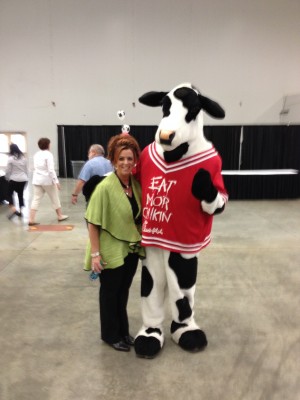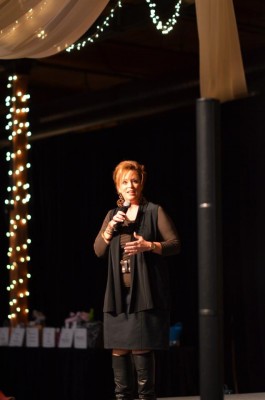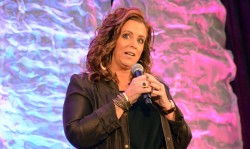 Getting Booked As A Motivational Speaker
Getting Booked As A Motivational Speaker
It’s a scary place – knowing you want to be a speaker – and not having any idea where to start. And there’s no rule book or manual. And there’s advice coming at your from all directions, and a lot of it contradicts itself. And the number one question I get over and over from speakers, new and even seasoned, is “How do I get people to pay me to speak?” So I’ve put together a list of what I believe is needed to get you booked. Maybe there are some things I haven’t addressed – but it’s a darn good start.

1. Know what you have to offer and how it fits what you think they need. What is it you help people do? If you just want to get up and tell your story – then you have something that’s about you, not them. And this needs to be about them.
Be sure to speak their language. What are they walking around wishing they could do? Be? Have? Accomplish?
Magazine covers are a good place to see what people need. Magazines spend a lot of money understanding what their audiences need to learn more about. Follow their lead. Use their big marketing budgets.
2. Have a brand and a style that’s clear. What makes you different from the other speakers speaking on the same subject? How are you different? What’s your style? Your personality? If you are a keynote speaker, your client is booking the personality as much as the content.
What’s your tag line?
How do people feel when they hear you speak?
What are your programs/shows like?
What do your testimonials say?
Poll your friends and ask them to give you three words they think describe you.
3. Know your market. Who is the best fit for what you do? Who do you want to target?
Be able to define your target group. Who are they? What age? What sex? A common industry? A common problem? A common desire or dream?
If your audience is sales people, what do they want? To close the sale! To win the contest! To beat out the competition!
If your audience is leaders, what do they want? To have impact. To make the hard choices. To leave a legacy. To have the tough conversations
While your message might fit anybody and everybody – you still need to pick some groups to target – to reach out to – to focus on.
If you are a motivational speaker and you say you motivate people – that’s not enough. You motivate them to do what? Sometimes we think just because we have a cool story, we are motivating. No. Motivation is about encouraging that audience – giving them courage – and giving them hope – to conquer their obstacle. What is that obstacle?
Some of the common “needs” in the business world that people constantly book speaker for: Motivation, Customer service, Team building, Dealing with stress and change, Leadership, Sales, Communication, Marketing, Social Media, Health and Wellness, etc. You can look on Bureau websites to see the categories they use to get a good idea of the needs of the groups to which you serve.
The key is to make sure you use THEIR language. If they are looking for something to form a stronger team, even if that sounds stale and boring to you, find a way to make sure they see how your program will help them do that.
4. Have a killer product. (That means a speech). Many speakers spend more time marketing and selling than they do learning how to be good on stage. No amount of selling will make up for a mediocre speech. Nothing builds business better than delivering a rock star performance that makes them jump to their feet, become raving fans, tell everyone about you, line up to book you, and refer you over and over.
5. Look like a rockstar online – on your website and other places. You can’t afford to look like another boring speaker with the church photo.
Your website will play an important part in their perception of your value. And here’s a clue: Being different is an asset. Think about:
The way you describe yourself. Get someone else to help make you sound better. Find exciting descriptive words.
The colors you use. Fresh and bold? Or expected?
The headshots. Boring and predictable or fun and exciting?
The photographs. They say subtle things about you.
The graphics. Stock or personal?
The videos. How many? How good are they? Do they SHOW what you do – not tell.
The text. This is your sales pitch. How is it?
The testimonials. Let your clients speak for you.
The places you’ve been and clients you’ve spoken for.
The products you have.
Don’t think realtor – think album cover
Check out other speaker’s sites – but don’t copy
6. List all the ways you can deliver your message and tell your stories – and then do it
Web
Facebook / social media
Blog radio
Live – on stage
Keynotes
Breakout sessions
Coaching
Retreats
Book
Magazine
Articles
CDs
DVDs
Blogging
7. Know what your audience calls you – as in WHAT WILL THEY TYPE IN ONLINE TO FIND YOU? Are there certain key words they use? This is important, because much of your job will be leading people to your website. It doesn’t do any good to call yourself a moticational educatainer if nobody is searching for that. You’re better off calling yourself (or at least using that language online) a customer service speaker.
8. Make sure you start a blog and write consistently. Be consistent with your brand. Give them what they love most from you. And after you blog, share it on all your social media sites. Make sure you speak about the subject you are speaking about – using those key words – and links to your site. You want to fill Google with your content.
9. Create a leads list. Do the research. Make calls. See where other speakers are getting booked. Start a list of places where you would like to speak. Keep adding to it as you get other leads. Add places you’ve already spoken and others like it. And take them off the list if they aren’t a good lead after all. For example, you might decide that the association of dairy farmers is a good fit for you – then add every state chapter to your list.
You’ll need to gather some information. Just call and ask if they ever have events where they book speakers, and if so, who is in charge of that. Try to get their contact information so you can send them something. Or call if you are comfortable with that. But be good at pitching yourself first.
10. Forget About Bureaus For Now. Yes, Bureaus can bring you a lot more business – but not until you have something worth selling. And being really good is not something worth selling. Get out there, get business on your own, make a name and a reputation for yourself – and wait until bureaus come knocking on your door. Then you can decide if you want to work with them or not.
.
11. Develop a plan to get business. Even if you’re not sure it’s the right plan – have a plan anyway. How to build your list. How often you will contact them. How you will contact them. How much you will charge. How much you will take. How much do you want to travel? What are your goals? Priorities? One thing at a time. Think about number 6.
12. Develop systems and processes for getting booked and handling the paperwork. Systems for speech writing and material organizing. How will you document leads? What about jobs? Clients? Receipts? Make sure create a strong system from when the client first calls to when the job is booked.
13. Create Your Documents.
Business Card
One Sheet
Contract
Invoice
Agreement
Proposal
14. Find an Accountability Partner / Mastermind Group. Someone you have to check into with assignments and goals.
15. Establish your fees and learn how to sell, pitch, negotiate. Remember that it’s not about what you’re worth, but what the market perceives your value to be. You shouldn’t really be charging until you are good and polished on stage.
16. Determine a plan for capturing emails in your audience and staying in touch. Building a list is CRUCIAL. What can you leave with them? How can you get their feedback, testimonials and referrals?
17. Determine a follow up plan for your clients. Now that the job is done, get a testimonial. Figure out if you can get other jobs like this. Ask for referrals.
18. Develop your plan for product creation. What you will create, and when. And how much you will sell it for. One step at a time. Doesn’t have to be a book. It can be a recording.
19. Leverage Current and Past Jobs For More. Make this a part of your system.
20. Look at who you already know – the contacts you already have – the groups you already belong to. Reach out to them first. Ask for opportunities to speak. These are practice opportunities, and they are doing you a favor. You should expect to do these for free, or a small honorarium.
And last, but not least – stay humble and remember where you started and always appreciate how far you’ve come.
Kelly Swanson is an award-winning storyteller, comedian, motivational speaker, Huffington Post Contributor, and cast member of The Fashion Hero television show airing on Amazon Prime. She is also the author of Who Hijacked My Fairy Tale, The Land of If Only, The Story Formula, and The Affirmation Journal for Positive Thinking. She was a featured entertainer for Holland America Cruise Lines, keynote speaker for the International Toastmasters Convention, and has keynoted major conferences and corporate events from coast to coast. She just launched her one-woman show Who Hijacked My Fairy Tale in theaters, and it is being booked all over the country. In July of 2022, she was inducted into the National Speakers Association Speaker Hall of Fame.
Note: Articles by Kelly may contain affiliate links and may be compensated if you make a purchase after clicking on an affiliate link.








